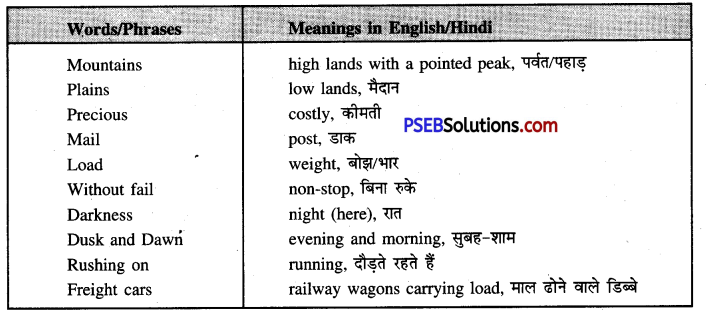Punjab State Board PSEB 7th Class English Book Solutions Poem 1 Trains Textbook Exercise Questions and Answers.
Class 7th English Solutions Poem Chapter 1 Trains Question Answers
Trains Class 7 Questions and Answers
Activity 1.
Look up the following words in a dictionary. You should seek the following information about the words and put them in your WORDS notebook.
1. Meaning of the word as used in the poem (adjective/noun/verb, etc.)
2. Pronunciation (The teacher may refer to the dictionary or the mobile phone for correct Pronunciation.)
3. Spellings
| Passenger | Precious | freight | |
| dusk | dawn | without | fail |
![]()
Post-reading
Vocabulary Expansion
Trains are a very important means of land transport in India. India has a large network of trains.
Activity 2.
Given below are some more means of transport. Put them under the right box.
| car | aeroplane | scooter | helicopter | boat | auto |
| bus | ship | submarine | train | jeep | bicycle |
| Land | sky | water |
| car bus scooter train auto jeep bicycle |
aeroplane helicopter |
ship submarine boat |
Activity 4
Read the following lines and answer the questions that follow : Through day and darkness, Through dusk and dawn.
Question 1.
What do the above lines refer to ?
Answer:
The above lines refer to trains running day and night.
Question 2.
What do the day and darkness’ and dusk and dawn’ in the poem tell the readers ?
Answer:
They tell us about the different times of the day. They also form pairs of opposite time.
Learning Language
Conjunctions : ‘so’, ‘because’. “although’. ‘and’, ‘yet
We use Conjunctions like ‘and, “or”, “but, “because’ and although’ to join two parts of sentences.
नोट:-वाक्य के दो या अधिक भागों को जोड़ने के लिए जिन शब्दों का प्रयोग किया जाता है, उन्हें Conjunctions कहते हैं।
![]()
Activity 5
1 Complete the sentences given below with ‘so’ or ‘because’. Here are a few examples. Read them before you do the activity.
Examples :
1. Rajan is happy because he has stood first in the race.
2. It was raining, so I did not go to school.
3. I went to the cinema because it was a holiday.
We use ‘because‘ for giving reasons, and ‘so’ for talking about results or purposes.
1. My dog was hungry …………. it stole biscuits from the shelf.
2. I am feeling sleepy …………….. I am very tired.
3. Babli bought new clothes ………….. she wanted to wear them on Diwali.
4. It was raining, …………. my books got wet.
5. He did not study hard, …………… he failed the test.
6. I asked for directions ………….. I was lost.
7. I did not clean the room, ………… it became dirty.
8. I met with an accident …………….. I was driving fast.
9. Deepa went to the doctor …………… she was feeling sick.
10. Mohan did not help Sohan …………….. he was not well.
Answer:
1. so
2. because
3. because
4. so
5. so
6. because
7. so
8. because
9. because
10. because.
Activity 6.
Combine the sentences given below using “although’ and ‘yet’. Write them in your notebook. Here are a few examples. Read them before you do the activity.
Examples :
1. Rajan did not win the race. Rajan was happy.
Although Rajan did not win the race, yet he was happy.
2. It was raining. I went to school.
Although it was raining, yet I went to school.
3. It was a holiday. I did not go to the cinema.
Although it was a holiday, yet I did not go to the cinema.
We use ‘although’ and ‘yet in the same sentence for unexpected or different information.
1. My dog was hungry. It did not eat biscuits.
2. He is very sleepy. He is watching a movie.
3. Babli wanted to wear new clothes on Diwali. Babli did not buy them.
4. It was raining. I did not take an umbrella.
5. He did not study hard. He passed the test.
6. I was lost. I did not ask for directions.
7. My room was dirty. I did not clean the room.
8. I was ill. I did not go to the doctor.
9. Mohan and Sohan were friends. Mohan did not help Sohan.
10. I went to the market. I did not buy anything.
Answer:
1. Although my dog was hungry. yet it did not eat biscuits.
2. Although he is very sleepy. yet he is watching a movie.
3. Although Babli wanted to wear new clothes on Diwali, yet she did not buy them.
4. Although it was raining, yet I did not take an umbrella.
5. Although he did not study hard, yet he passed the test.
6. Although I was lost, yet I did not ask for directions.
7. Although my room was dirty, yet I did not clean it.
8. Although I was ill, yet I did not go to the doctor.
9. Although Mohan and Sohan were friends, yet Mohan did not help Sohan.
10. Although I went to the market, yet I did not buy anything.
![]()
Learning to Listen
Activity 7.
Listen to the teacher, recite the following poem and repeat after her/him.
Clouds

White sheep. white sheep,
On a blue hill,
When the wind stops,
You all stand still.
When the wind blows.
You walk away slow,
White sheep,
white sheep
Where do you go?
नोट : विद्यार्थी स्वयं करें।
Learning to Speak
Activity 8
Speak the following pairs aloud. (ऊंची आवाज़ में बोलें)
1. mail — fail
2. dawn — lawn
3. plains — trains
Activity 9 (Pairwork)
Discuss with your partner about how you would like to travel. You can discuss the following questions with each other.
1. Do you like to travel by train/ship/plane ?
2. How would you like to travel if you have to go from Punjab to Mumbai ? Why ?
3. If you decide to go by train, what would you like to take with you ?
Learning to Write
Activity 10
Paragraph Writing:
पैराग्राफ़ किसी विषय की संक्षिप्त व्याख्या होती है। यह लगभग 100 शब्दों में लिखा जाता है। इसके पहले वाक्य में विषय का परिचय दिया जाता है, जबकि इसका अंतिम वाक्य विषय का निष्कर्ष होता है। पैराग्राफ़ के मध्य भाग में विषय से जुड़ी मुख्य बातों का वर्णन किया जाता है। ध्यान रहे कि यह पैराग्राफ़ एक ही विचार या बिन्दु पर केंद्रित हो।
A Journey by Bus I went to Jalandhar by bus last month. I hired an e-rickshaw and reached the bus stand. I went to the booking window. There was a great rush. I got the ticket on my turn. The bus came and I got into the bus. There was no room in the bus. Many people were standing.
I could not get any seat. It was very hot. I was sweating. Soon the conductor whistled. The bus started. I felt easy. Some passengers got down at Phagwara. Now I got a seat near the window. I looked out of the window. Greenfields looked very beautiful. Farmers were at their work. Cattle were grazing. Our bus crossed many bridges on the way. At last the bus reached Jalandhar. It took me three hours to reach there. I enjoyed the journey but I got tired.

Stanzas For Comprehension
Read the stanzas given below and answer the questions that follow each :
(1) Over the mountains,
Over the plains,
Over the rivers,
Here come the trains.
Carrying passengers,
Carrying mail,
Bringing their precious loads
In without fail.
![]()
(i) Where do the trains move?
रेलगाड़ियां कहाँ चलती हैं ?
(ii) What do they carry ?
वे क्या उठाती है।?
(iii) Name the poem and the poet.
कविता और कवि का नाम बताओ।
Answer:
(i) The trains move over the mountains, plains and rivers.
(ii) They carry passengers, goods and precious loads.
(iii) The name of the poem is ‘Trains’ and that of the poet is James S. Trippett.
(2) Thousands of freight cars
All rushing on Through day and darkness,
Through dusk and dawn,
Over the mountains,
Over the plains,
Over the rivers,
Here come the trains.
(i) What is rushing on ?
क्या – क्या चीज़ दौड़ती रहती है ?
(ii) When do they rush on?
वे कब दौड़ती हैं?
(iii) What is the central idea of the poem?
कविता का केन्द्रीय भाव क्या है ?
Answer:
(i) Thousands of freight cars are rushing on.
(ii) They rush on all through day and night.
(ii) Trains run day and night. They provide a great service to the country by carrying people and their costly load.
![]()
Word Meanings.

Trains Summary in Hindi
यह कविता रेलगाड़ियों के बारे में है। रेलगाड़ियाँ दिन-रात दौड़ती रहती हैं। वे कभी नहीं रुकतीं। वे पर्वत, नदियाँ, मैदान सब कुछ पार कर जाती हैं। वे डाक, यात्रियों तथा उनके कीमती सामान को लाद कर ले जाती हैं। वे माल (भारी सामान) को ढोती हैं। वे सुबह शाम कुछ नहीं देखतीं। वे दौड़ती ही रहती हैं।
My English Companion for Class 7 PSEB Solutions Poetry
